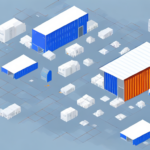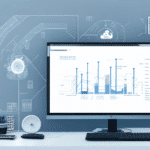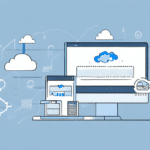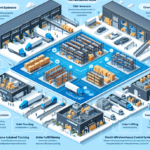Infor CloudSuite WMS vs. 3PL Central (3PL Warehouse Manager)
As businesses continue to expand their operations, effective management of supply chains becomes increasingly critical. One of the key components of supply chain management is a Warehouse Management System (WMS). These systems help companies optimize warehouse operations, reduce costs, and improve customer service. Two popular WMS solutions in the market are Infor CloudSuite WMS and 3PL Central (3PL Warehouse Manager). This article compares their features, deployment options, integrations, user interfaces, customization capabilities, pricing, customer support, security features, and case studies to help businesses make an informed decision.
Understanding Warehouse Management Systems (WMS)
A Warehouse Management System (WMS) is a software application that manages and optimizes the day-to-day operations of a warehouse. This includes inventory tracking, order fulfillment, shipping and receiving, and labor management. According to Gartner, implementing a WMS can increase warehouse efficiency by up to 20% while reducing operational costs.
Key benefits of a WMS include:
- Real-time inventory visibility
- Improved order accuracy and fulfillment speed
- Enhanced labor productivity
- Optimized storage and space utilization
Comparison of Features
Core Functionalities
Infor CloudSuite WMS and 3PL Central offer a comprehensive range of features to manage warehouse operations effectively:
- Inventory Management
- Order Fulfillment
- Shipping and Receiving
- Labor Management
- Billing and Invoicing
- Real-time Inventory Visibility
- Reporting and Analytics
Advanced Capabilities
Infor CloudSuite WMS provides advanced warehouse automation capabilities, such as voice-directed picking and automated material handling, which can significantly increase efficiency and reduce errors. Meanwhile, 3PL Central introduces the unique SmartScan feature, allowing warehouse workers to use mobile devices for real-time barcode scanning and inventory transactions, minimizing manual data entry and enhancing accuracy.
Deployment Options: Cloud-Based vs. On-Premise
Both Infor CloudSuite WMS and 3PL Central offer flexibility in deployment:
Cloud-Based Deployment
- Accessible from any device with an internet connection
- Automatic updates and minimal maintenance
- Reduced IT costs
- Scalable and flexible
- Enhanced disaster recovery options
On-Premise Deployment
- Installed locally on company servers
- Full control over data security
- Higher customization and integration capabilities
- Requires dedicated IT support for maintenance
The choice between cloud-based and on-premise deployment depends on a business's specific needs, including data security requirements, customization needs, and budget considerations.
Integrations with Third-Party Systems
Seamless integration with other systems is crucial for optimizing warehouse operations. Both Infor CloudSuite WMS and 3PL Central integrate with a variety of third-party applications, including:
- Enterprise Resource Planning (ERP) Software
- Transportation Management Systems (TMS)
- Warehouse Automation Systems
- E-commerce Platforms like Shopify and Magento
- Parcel Carriers such as FedEx and UPS
These integrations facilitate seamless data flow between different business functions, streamlining operations and reducing the risk of errors. For example, integrating with an ERP system can provide comprehensive visibility across the entire supply chain.
User Interface and Ease of Use
An intuitive and user-friendly interface is essential for minimizing training time and maximizing productivity. Both Infor CloudSuite WMS and 3PL Central excel in this area:
- Intuitive Navigation: Easy access to key functionalities and streamlined workflows.
- Customizable Dashboards: Tailored views to monitor specific metrics and performance indicators.
- Comprehensive Training and Resources: Offering tutorials, webinars, and documentation to assist users.
- Advanced Reporting Capabilities: Allows for in-depth analysis and informed decision-making.
These features enable businesses to efficiently monitor and manage their warehouse operations, leading to increased productivity and reduced operational bottlenecks.
Customization and Scalability
Both Infor CloudSuite WMS and 3PL Central offer robust customization and scalability options:
- Customization: Users can create custom fields, modify workflows, and add new reports to tailor the system to specific business needs.
- Scalability: Easily add new users, locations, and warehouses as the business grows. Both systems also integrate with other software, such as TMS, providing a comprehensive solution for managing the entire supply chain.
This flexibility ensures that the WMS can adapt to evolving business requirements and support long-term growth.
Pricing Models and Total Cost of Ownership (TCO)
When evaluating the cost-effectiveness of a WMS, it's important to consider both direct and indirect costs. Both Infor CloudSuite WMS and 3PL Central operate on subscription-based pricing models, which vary based on the number of users and required features:
- Direct Costs: Software licensing fees.
- Indirect Costs: Training, support, and maintenance expenses.
- Additional Costs: Integration with other platforms and add-on modules can impact the overall cost.
For instance, Infor CloudSuite WMS offers additional modules like labor and transportation management, which can increase the total cost of ownership. Similarly, 3PL Central's integrations with platforms like Shopify and Magento are essential for businesses with significant online sales.
Businesses should conduct a comprehensive cost analysis to determine the total cost of ownership and ensure that the chosen WMS aligns with their budget and financial objectives.
Customer Support, Training, and Resources
Effective customer support and training are vital for the successful implementation and use of a WMS:
- Infor CloudSuite WMS:
- Extensive user guides, tutorial videos, and webinars
- 24/7 customer support and dedicated account managers
- Integration support with ERP and TMS systems
- 3PL Central:
- Personalized one-on-one training sessions
- 24/7 phone and email support
- Comprehensive documentation and online resources
Evaluating the quality and accessibility of customer support and training resources is essential when selecting a WMS, as it directly impacts the system's effectiveness and the user's experience.
Security Features and Compliance Standards
Data security and compliance are paramount for any WMS to protect sensitive information and meet industry standards:
- Infor CloudSuite WMS:
- Compliance with PCI-DSS and HIPAA standards
- Role-based access controls to restrict data access
- Data encryption and regular security updates
- Multiple layers of physical security in data centers
- 3PL Central:
- SOC 2 Type II certified
- Role-based access controls
- Data encryption and regular security patches
- Biometric access controls, video surveillance, and 24/7 security personnel in data centers
These robust security measures ensure that sensitive data is protected against unauthorized access, cyber threats, and physical breaches, thereby maintaining compliance with industry regulations.
Case Studies: Real-World Examples
Examining real-world implementations provides valuable insights into how Infor CloudSuite WMS and 3PL Central perform in various business environments:
- Infor CloudSuite WMS:
- A major manufacturer reduced lead times by 50% through optimized inventory management.
- A regional retail chain decreased inventory carrying costs by 20% by improving order accuracy and reducing stockouts.
- 3PL Central:
- A logistics company achieved 99% inventory accuracy by leveraging real-time barcode scanning with SmartScan.
- A food and beverage distributor reached 98% order accuracy, enhancing customer satisfaction and reducing returns.
These case studies demonstrate the potential benefits of implementing a WMS. However, businesses should assess their unique needs, including warehouse size, operational complexity, and integration requirements, to determine the most suitable solution.
Conclusion: Choosing the Best WMS for Your Business
Both Infor CloudSuite WMS and 3PL Central (3PL Warehouse Manager) offer robust features, flexible deployment options, extensive integrations, user-friendly interfaces, extensive customization capabilities, and strong scalability. The choice between the two ultimately depends on your business's specific needs and preferences. Key factors to consider include:
- Pricing: Ensure the total cost of ownership aligns with your budget.
- Customer Support: Evaluate the quality and availability of support and training resources.
- Security: Assess the security features and compliance standards to protect your data.
- Integrations: Ensure compatibility with your existing systems and third-party applications.
Reviewing real-world case studies can provide further insights into each platform's performance and suitability for your business. Selecting the right WMS will help optimize your warehouse operations, reduce costs, and enhance customer service, ultimately contributing to the success and growth of your business.
Additional Resources
For more information on Warehouse Management Systems, consider exploring the following resources:
- What is a Warehouse Management System? - Supply Chain Digital
- The Future of Warehouse Management Systems - Forbes
- The Forrester Wave: Warehouse Management Systems - Forrester




















